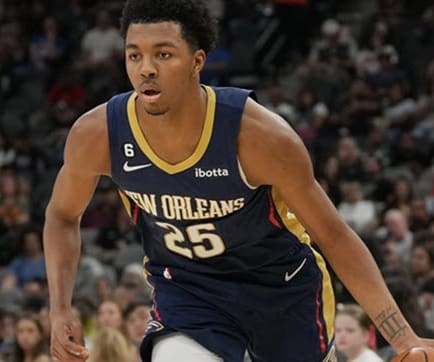2025 Stats
PTS
13.2
REB
4.9
AST
0.8
STL
0.9
BLK
0.9
ROS Projections
2025 Fantasy Outlook
After two years in Utah, Collins was on the move again this offseason. The Jazz dealt the veteran forward to the Clippers in a multi-team trade centered around Norman Powell heading to Miami. Collins' production has been on a downward trend since his early years in Atlanta, and health became an issue again last season, as he appeared in a career-low 40 games. Collins has always been a good player, and his game translates to fantasy, but there have been questions about his upside. He'll have extra financial motivation this season, playing under an expiring $26 million player option. Whether starting in the frontcourt with Kawhi Leonard and Ivica Zubac or operating as a sixth man, head coach Tyronn Lue will likely find ways to get Collins 25-plus minutes a night. However, when things aren't going well, Lue will have plenty of options to pick from given the Clippers' depth. Collins seems like an ideal fit with James Harden, as the former can be a lob threat and sink corner threes at a high rate, something the Clippers lack with Zubac and Brook Lopez at center. Collins certainly doesn't warrant a top-100 pick, but he's a safe selection after pick 125. Read Past Outlooks

Chips in 11 points in win
Collins recorded 11 points (5-7 FG, 1-3 3Pt), four rebounds, one steal and one block in 26 minutes during Monday's 110-106 victory over the Wizards.
ANALYSIS
Collins was available off the bench for Friday's win over the Raptors in Toronto after a one-game absence with a groin injury, but the veteran big man didn't see the floor at any point during that contest. He returned to his usual starting role Monday, signaling that he is fully healthy. Over his last 10 outings, Collins has averaged 14.5 points, 5.5 rebounds, 1.6 blocks and 2.2 three-pointers in 28.2 minutes per game while shooting a scorching 61.1 percent from downtown.
Collins was available off the bench for Friday's win over the Raptors in Toronto after a one-game absence with a groin injury, but the veteran big man didn't see the floor at any point during that contest. He returned to his usual starting role Monday, signaling that he is fully healthy. Over his last 10 outings, Collins has averaged 14.5 points, 5.5 rebounds, 1.6 blocks and 2.2 three-pointers in 28.2 minutes per game while shooting a scorching 61.1 percent from downtown.
NBA Per Game Stats
Per Game
Total
Per 36
NBA Per Game Stats
Loading Per Game Stats...
2025 NBA Game Log
2025
2024
2023
2022
2021
2020
2019
2018
2017
2025 NBA Per Game Split Stats
Schedule
By Month
Starting/Off Bench
Days Rest
Vs Opp
By Result
2025 NBA Per Game Split Stats
Loading Split Stats...
Advanced Stats
Loading Advanced Stats...
Stat Review
2025
2024
2023
2022
2021
2020
2019
2018
2017
How does John Collins compare to other players?
This section compares his stats with all players from the previous three seasons (minimum 200 minutes played)*. The bar represents the player's percentile rank. For example, if the bar is halfway across, then the player falls into the 50th percentile for that stat and it would be considered average.
True Shooting %
65.8%
Effective Field Goal %
63.3%
3-Point Attempt Rate
34.8%
Free Throw Rate
22.1%
Offensive Rebound %
5.9%
Defensive Rebound %
14.5%
Total Rebound %
10.3%
Assist %
4.8%
Steal %
1.4%
Block %
3.0%
Turnover %
11.1%
Usage %
18.4%
Fantasy Points Per Game
24.1
Fantasy Points Per Minute
0.9
NBA Historical Fantasy Stats
Historical ADP
Loading Historical ADP...
Clippers Depth Chart
Our full team depth charts are reserved for RotoWire subscribers.
Subscribe Now
Clippers Rotation: Minutes Breakdown
Loading Clippers Rotation Data...
Average Fantasy Points
Minutes
FanDuel
DraftKings
Yahoo
FantasyDraft
Head2Head
Sorare
Average Fantasy Points are determined when John Collins was active vs. non-active during the season. Click here to view average fantasy points for a different time period.
Loading Average Minutes...
Past Fantasy Outlooks
2024
2023
2022
2021
2020
2019
2018
2017
Collins spent the first six years of his career in Atlanta. He peaked in 2019-20 while averaging 21.6 points, 10.1 rebounds and 1.6 blocks, but he went on a downward trajectory after that. He became the topic of trade rumors for years and was finally dealt to the Jazz last summer in what essentially amounted to a salary dump. There was some hope for a bounceback season, and the results were mixed. His numbers were especially underwhelming to start the year, going most of the way through January. However, he stepped up his game at the end of the month, and for his final 27 appearances, he averaged 17.1 points, 9.7 rebounds, 1.3 assists and 1.0 blocks while shooting 58/40/79. The Jazz have become a difficult team to analyze for fantasy. They've pulled the plug toward the end of each of the past two seasons, creating well-timed absences for key players. It doesn't project to be any different this year. Lauri Markkanen signed a massive extension that prevents him from being traded at the deadline, but the rumors were still out there that the front office was looking to send him to a more competitive team. As it stands, Utah could easily be considered a bottom-two team in the conference, along with Portland. Will all of that be good or bad for Collins? He just happened to miss the final eight games of last season with back spasms, at the exact same time that Jordan Clarkson had a back injury and Markkanen had a shoulder injury. But Collins also played well when available in the second half of the year. And this is before considering the potential for Walker Kessler and Taylor Hendricks to develop and take minutes away from Collins. With all that in mind, it's probably not worth the risk to select Collins significantly inside the top 100. After that, the risk/reward balance becomes more favorable.
More Fantasy News

Not starting Friday
Collins is not in the starting lineup for Friday's game in Toronto, NBA writer Justin Russo reports.
ANALYSIS
Subscribe now to instantly reveal our take on this news.
Subscribe now to instantly reveal our take on this news.

Available to play
Collins (groin) is available for Friday's game in Toronto.
ANALYSIS
Subscribe now to instantly reveal our take on this news.
Subscribe now to instantly reveal our take on this news.

Iffy for Friday
Collins (groin) is questionable for Friday's game against Toronto, Law Murray of The Athletic reports.
ANALYSIS
Subscribe now to instantly reveal our take on this news.
Subscribe now to instantly reveal our take on this news.

Ruled out for Wednesday
Collins (groin) won't suit up for Wednesday's game versus the Wizards, Law Murray of The Athletic reports.
ANALYSIS
Subscribe now to instantly reveal our take on this news.
Subscribe now to instantly reveal our take on this news.

Late addition to injury report
Collins (groin) is questionable for Wednesday's game against the Wizards.
ANALYSIS
Subscribe now to instantly reveal our take on this news.
Subscribe now to instantly reveal our take on this news.
Latest Fantasy Rumors

Clippers unlikely to move him
The Clippers do not appear interested in moving Collins despite prior exploratory trade conversations, Tomer Azarly of Clutch Points reports.
ANALYSIS
Collins has played well in an expanded role, producing efficiently on both ends of the floor over the past month. His strong play has solidified his standing as part of the team's core for the remainder of the season. Over his last 12 outings, Collins has posted averages of 15.1 points, 5.0 rebounds, 1.5 blocks and 2.5 three-pointers in 27.9 minutes per contest.
Collins has played well in an expanded role, producing efficiently on both ends of the floor over the past month. His strong play has solidified his standing as part of the team's core for the remainder of the season. Over his last 12 outings, Collins has posted averages of 15.1 points, 5.0 rebounds, 1.5 blocks and 2.5 three-pointers in 27.9 minutes per contest.







